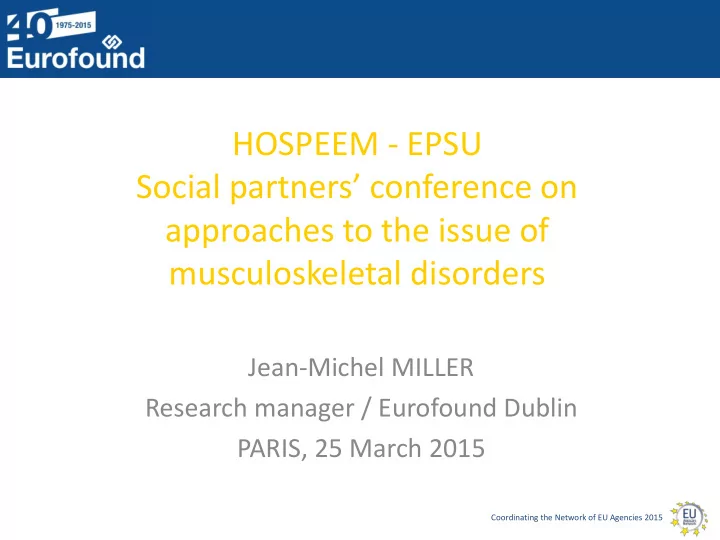

HOSPEEM - EPSU Social partners’ conference on approaches to the issue of musculoskeletal disorders Jean-Michel MILLER Research manager / Eurofound Dublin PARIS, 25 March 2015 Coordinating the Network of EU Agencies 2015
EUROFOUND EUROFOUND: European Foundation for the Improvement of Living and Working Conditions Established in 1975 / Dublin Comparative socio- economic research Tripartite European Agency Staff: 120 persons Budget: EUR 20.5m 3 Coordinating the Network of EU Agencies 2015
Size and nature of the phenomenon of musculoskeletal disorders • My presentation • Information on the: • - sector, • - definition, • - data sources, • - extent, • - reasons for the phenomenon’s level, • - looking forward – comments. Coordinating the Network of EU Agencies 2015
The sector • Employment in the human health sector increasing (2008-10: +3,1% / 10-12: +1,9%). (Eurostat 2008-12) • Differences between countries – as well reflection of societal choice. • Female dominated sector and large proportion of older workers. Percentage of women (57%) and men (46%) reporting to have a female boss are above EU 28 average (47% and 12% respectively). (Source: always EWCS 2010 except if otherwise indicated) • Demographic evolution and perspectives. • “Societal change creates new opportunities: “White jobs” have been one of the engines of employment growth in recent years (+ 3.3 million since 2000)... Ageing will reinforce this trend .” ( Background Information for the Informal European Council, 11 February 2010) Coordinating the Network of EU Agencies 2015
Definition • “ Work-related health problems and illnesses are those health problems and illnesses which can be caused, worsened or jointly caused by working conditions. This includes physical and psychosocial health problems” (EU statistical acquis). • Musculoskeletal disorders (MSDs) are characterised by pain and loss of physical function in the body, which limits a person’s activities and restricts their participation in society. • These diseases may be chronic and their symptoms may appear only after prolonged exposure to work related risk factors, such as awkward postures, repetitive tasks, carrying heavy loads and applying force or pressure. Organisational problems can be at the root of MSDs; a participatory approach to prevention policies has found to be effective. Coordinating the Network of EU Agencies 2015
SURVEYS / Information sources • LFS – ad hoc module (work related accidents and health problems) undertaken in 1999, 2007 and 2013 (results not yet available). • EWCS ( … work organisation, training, physical and psychosocial risk factors, health and safety, worker participation … ) undertaken since 1990, field work for the 2015 edition ongoing. • National sources (legal definitions; social security agencies set the list of diseases for which the occupational cause for MSDs is presumed). Coordinating the Network of EU Agencies 2015
Coordinating the Network of EU Agencies 2015
Coordinating the Network of EU Agencies 2015
Coordinating the Network of EU Agencies 2015
Coordinating the Network of EU Agencies 2015
Coordinating the Network of EU Agencies 2015
Coordinating the Network of EU Agencies 2015
Coordinating the Network of EU Agencies 2015
Coordinating the Network of EU Agencies 2015
Coordinating the Network of EU Agencies 2015
Coordinating the Network of EU Agencies 2015
Coordinating the Network of EU Agencies 2015
Coordinating the Network of EU Agencies 2015
Coordinating the Network of EU Agencies 2015
What makes the difference?: Findings from a special evaluation of the IAB survey 21 Coordinating the Network of EU Agencies 2015
Looking forward • Reality of MSDs cannot be denied. It varies according to countries sectors, gender, age groups … and averages certainly hide differences. • Understand the demographics, societal and economic change. • Encouraging to see that better working conditions (lower levels of MSDs) are achieved when training is provided and a consultation process implemented. • How can new technologies support the delivery of care, support employees and transform the lives of all concerned? Coordinating the Network of EU Agencies 2015
Comments "One fit all" solutions do not exist company realities company possibilities employees’ working conditions employees’ demands "Win-Win" solutions are needed two sides of industry have to elaborate solutions for the appropriate level Coordinating the Network of EU Agencies 2015
Openings in the debate • Debate on room to manoeuvre / work organisation development • Programmes on inclusive workplaces with workers’ involvement merit attention • Early intervention "when designing the work place" has become the focus of attention • Information / consultation and training are an element of prevention policies. • Social dialogue is the adequate instrument the two sides of industry have at their disposal. Coordinating the Network of EU Agencies 2015
• Merci pour votre attention! Jean-Michel MILLER • jmm@eurofound.europa.eu • www.eurofound.europa.eu 25 Coordinating the Network of EU Agencies 2015
Recommend
More recommend